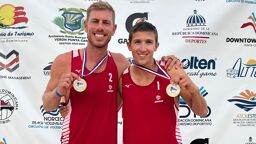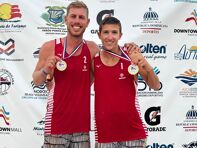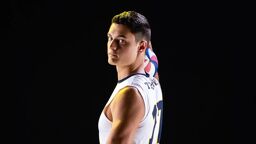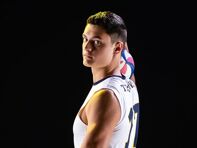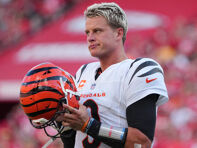Ian Bicko initially hated playing beach volleyball.
“It’s hot,” he remembered. “There’s no AC. I’m getting sand in my ears. It’s in my eyes. I don’t have the right sunglasses. I’m getting sunburned. It’s just like too much for me. I can’t jump because of the sand.”
That was Bicko’s introduction to two-man beach volleyball, and it was a jarring switch from the indoor game the 6-8 player was used to from high school and college.
But the game on the sand eventually hooked him, took him from a dark place and led him to use his sport to advocate for people with HIV.
Get off the sidelines and into the game
Our weekly newsletter is packed with everything from locker room chatter to pressing LGBTQ sports issues.
“It’s really a kind of a new space for me and HIV advocacy,” he told Outsports. “There’s not enough in my opinion. I don’t know of any athletes, besides, I guess Magic Johnson, that are living with HIV. And I’m sure there are people out there.
“I’ve always really connected with sports and athletes and the journey that comes with that and the hard work and struggle that comes with sport. And I guess I always look to those spaces for role models and I’m not seeing anybody that’s living with HIV in this space and I find it hard to believe that there’s no one else.”
‘I couldn’t lie my way out of this one’
In 2017, Bicko got the shock of his life when what he thought of as a routine HIV test showed he was positive.
“I’ll never forget receiving the news,” Bicko, who is gay, wrote in Poz Magazine. “I don’t know how long I sat in that cramped room at the Mobile [Alabama] Public Health Department. The room was cramped and filing cabinets lined each wall. The windows were frosted glass, and I just stared at the blank window for I don’t know how long.
“They called me and told me to come in to go over my results. They wouldn’t give me the results over the phone. I knew that wasn’t good because usually, it was a quick phone call to tell me my results were clear. I sat down, and I was handed a yellow piece of paper: syphilis. My heart dropped; I was so relieved. I didn’t see the pink piece of paper that the man was about to give me still in his hand.
“I look back on my life, and I feel like, in many ways, the day I was diagnosed is when I began living. Before my diagnosis, I was barely out of the closet. I didn’t like myself. Hated myself even. I didn’t know how to reconcile my sexuality with my faith. I was a very scared and, honestly, depressed person. Being Christian and a closeted gay man, unfortunately, made me an excellent liar. I was never actually myself in my first 25 years of life. Finding out I had HIV forced me to look at myself in the mirror and make real changes. I couldn’t lie my way out of this one.”

After the diagnosis, Bicko began isolating himself. He wasn’t dating and little seemed to matter. That’s when JD, a friend and teammate from their University of South Alabama volleyball days, pushed him to put aside his hatred of sand and give it a go on the beach. It turned out to be excellent medicine.
“We went out and just played pickup on the beach for hours. I was like, ‘Wow, I really love this’ and I realized that afterwards I was the happiest I’ve been in a while,” Bicko told Outsports. “I was smiling. It kind of made me realize that I could still be myself around people that I love and care about.”
Related


Gay beach volleyball team of Kyle Friend and Tim Brewster finds love off the sand
Kyle Friend and Tim Brewster have formed a formidable partnership on the AVP Pro Beach Tour. Now they’ve gone public with their relationship.
By Jon Holmes | March 27, 2024

How gay beach volleyball player uses TikTok to build a community
Charlie Siragusa has found social media vital to building his brand but more importantly to find a community with other queer people from different walks of life.
By Charlie Siragusa | July 13, 2022
Bicko, 33, then started training seriously with JD, spending hours practicing his craft and coming out of his isolation. Self-described as “toxically competitive,” Bicko drove himself to see how far he could go. Seven years later, he’s carved out a niche on the semi-pro beach circuit.
‘You’re out there with your body on full display’
As a semi-pro, Bicko doesn’t earn enough playing to support himself. His day job is with a nonprofit, writing grants for disaster recovery, a remote job that allows him to travel to tournaments, playing an estimated 30 weeks a year. Three times, Bicko has made it to a qualifier for the major AVP tour, but as yet to qualify for the main draw. Still, he loves what he’s doing.
“I sacrificed a lot to get where I am and I’m still pretty mediocre in my opinion, but I know I just I really love it. I love how I feel when I play. I love what the sport teaches me since it’s played in pairs. There’s a certain mental and mental aspect that comes with that. You’re always comparing yourself to your partner. You’re always like trying to get the best out of the person you’re playing with.
“There’s literally nowhere to hide. You’re out there with your shirt off, your body on full display. [The sport] has taught me a lot about emotional intelligence and to be there for somebody. … It’s been a great way to travel the country and meet a really great community of people. Sometimes I get my ass kicked by future Olympians, but sometimes I get to beat them. Just kind of depends on the day.”

Bicko was raised Christian in a small, rural town in northwest Pennsylvania, where being gay was not accepted. He’s found the beach volleyball community very welcoming and, as an example, points to a private chat group he is in with eight other gay players, a group they jokingly call the GayVP.
“We’re texting each other each week, wishing each other luck and we’ll send the brackets to each other and we can all kind of keep up on how we’re finishing,” he said. “This has been really cool. I don’t think most people have that. It’s been great that we have that together.”
As much fun Bicko has playing volleyball, he’s also using his status as an athlete to draw attention to the HIV/AIDS community, seeking to dispel stereotypes and myths that still surround the disease. For example, after he publicly disclosed his HIV status on social media, he received a private message from a fellow player who was ignorant of how HIV is spread and told him he was putting other players in danger because “we all are like touching the same volleyball and [I was] sweating on the volleyball,” Bicko said.
Bicko calmly replied to this player with medical facts and while the player didn’t apologize, he was accepting of the information.
A New Orleans resident, where he lives with Ryan, his boyfriend of two years, Bicko volunteers for the HIV advocacy group Bounce to Zero. “There’s still so much misinformation, so much stigma out there,” he said.
‘I’m speaking directly to the gay community’
I asked Bicko to discuss the myths still surrounding living with HIV and what advice he has for those dealing with a positive diagnosis.
“At this point, it’s so controllable,” he said. “Medications, free medications that prevent HIV transmission like PREP/PEP are widely available for people that are HIV negative. Additionally, there is lifesaving medication available for people living with HIV that will not only suppress the virus enough for you to live a healthy and normal life, but will also prevent you from transmitting HIV to others. While we are short of a cure, science is literally attacking this virus from both ends.
“Stigma is the most ominous barrier to progress. Progress from people enrolling in services, and progress in families accepting their loved ones positive status.
“When I say that, I’m speaking directly to the gay community. While at times the most accepting, the gay community (specifically gay men) is also the most exclusionary for people living with HIV. I’ve experienced the most rampant fear and lack of education from the gay community around the topic of HIV. Don’t dismiss HIV stigma to just straight or religious groups. It’s just as bad, if not worse in the LGBTQI+ community.
“Lastly, if you’re living with HIV, you’re allowed to have dreams. You’re allowed to envision a future for yourself, because guess what? If you start taking the necessary medication, you’ll live long enough to see those dreams to fruition. I think we get caught up in the narrative of: It’s not a death sentence.” While that’s true, we are so much further along than that.
“You have permission now, today, to live your life. If you die prematurely, it’s not going to be because of your HIV status. Please, look at the value of your life and enroll in the free and life saving treatment available to you.”
You can follow Ian Bicko on Instagram.

